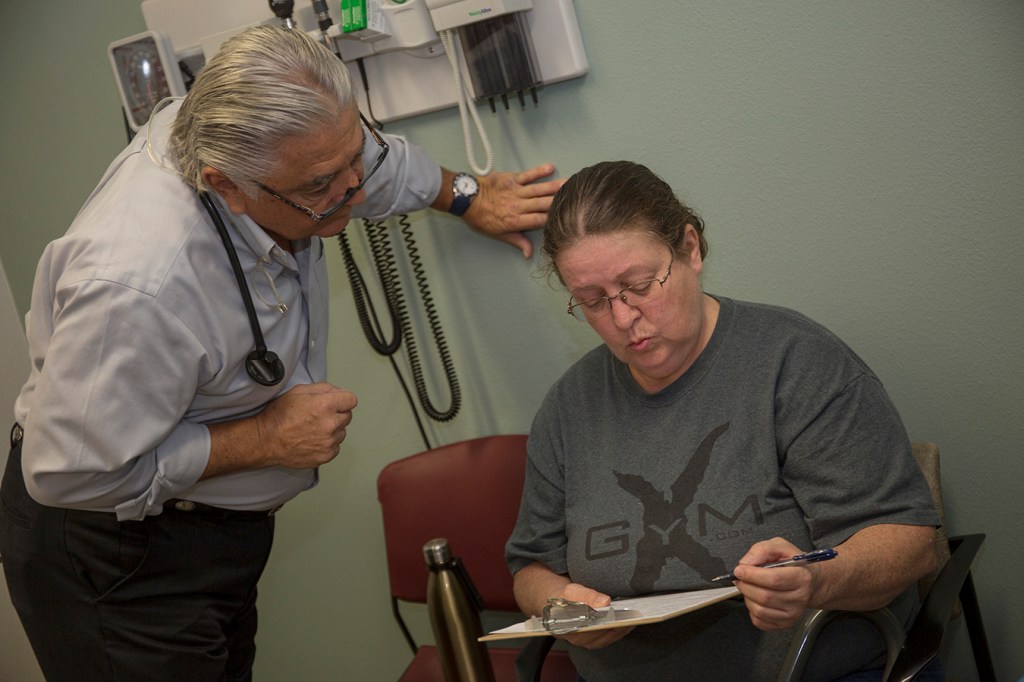When a hepatitis C treatment called Harvoni was released in 2014, Dr. Ronald Cirillo knew it was a big deal.
“It’s the reason that dragged me out of retirement!” he said.
Cirillo specialized in treating hepatitis C for more than 30 years in Stamford, Conn., before retiring to Bradenton, Fla. During his time in Connecticut, the only available treatment for hepatitis C had terrible side effects and didn’t work well. It cured the viral infection less than half the time. But the newer drugs, Harvoni and Sovaldi, cure almost everybody, with few adverse reactions.
“In my lifetime, I’ve seen it change from a horrible treatment to a manageable treatment,” Cirillo says.
His mission is finding the patients.
“The disease is out there,” he said. “My job is to get the disease in here, so we can follow them and treat them.”
Last year, Cirillo joined the Turning Points free clinic in Bradenton, about an hour south of Tampa. The clinic primarily serves uninsured Floridians who fall into what many call a coverage gap in states like Florida that chose not to expand Medicaid. These are people who make less than about $12,000 a year.
Cirillo is trying to test every high-risk patient he encounters. On a recent weekday in the clinic, his assistant pricked a patient’s finger, and squeezed blood onto the end of a small plastic tube.
“And this little measuring tool goes into the blood and solution mix there,” Cirillo said. “We are going to time it — 20 minutes and that’s it. That’s the test.”
Nearly 30,000 people in Florida were found to have hepatitis C in 2016. It’s likely that many more are infected, because the virus can lie dormant for decades.
Cirillo spearheaded a partnership with Harvoni’s maker, Gilead Sciences, and that partnership has provided treatment to about 100 patients.
“We treat people without any insurance, that have no hope,” Cirillo said.”If you qualify to be a patient here, you’ll get tested.”
A 57-year-old patient named Patricia discovered she had hepatitis C a few months ago during a trip to the clinic. NPR and Kaiser Health News are not using her last name because the virus is sometimes associated with illegal IV drug use. It can also spread via sex. Patricia said she’s not sure how she got it.
“So, just because of my age, I guess, they went ahead and tested me for it and it blew my mind that I actually had hep C,” she said. “And the levels ended up being relatively high.”
The virus had started to scar and inflame her liver. But she lacked insurance and a job; the $94,000 Harvoni treatment would have been out of reach if she hadn’t had financial help from the drugmaker.
“I would never have been able to afford that treatment,” she said. “Never.”
Staff at the clinic help patients fill out the complicated application from Gilead. Only patients who don’t have insurance, have been drug-free for at least six months and who meet income requirements are eligible.
Patricia was able to get the treatment — one pill a day for 12 weeks — and will be tested again in three months to determine whether she is free of hepatitis C.
“Had they not discovered it and gotten me onto the program — really, who knows?” she said.
This story was produced with the USC Center For Health Journalism’s National Fellowship and Kaiser Health News.
KFF Health News' coverage of prescription drug development, costs and pricing is supported in part by the Laura and John Arnold Foundation.







